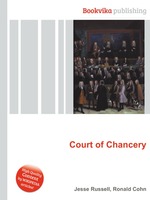Court of Chancery
Jesse Russell Ronald Cohn
бумажная книга
High Quality Content by WIKIPEDIA articles! The Court of Chancery was a court of equity in England and Wales that followed a set of loose rules to avoid the slow pace of change and possible harshness (or "inequity") of the common law. The Chancery had jurisdiction over all matters of equity, including trusts, land law, the administration of the estates of lunatics and the guardianship of infants. Its initial role was somewhat different, however; as an extension of the Lord Chancellor`s role as Keeper of the King`s Conscience, the Court was an administrative body primarily concerned with conscientious law. Thus the Court of Chancery had a far greater remit than the common law courts, whose decisions it had the jurisdiction to overrule for much of its existence, and was far more flexible. Until the 19th century, the Court of Chancery was able to apply a far wider range of remedies than the common law courts, such as specific performance and injunctions, and also had some power to grant damages in special circumstances. With the shift of the Exchequer of Pleas towards a common law court, the Chancery was the only equitable body in the English legal system.


